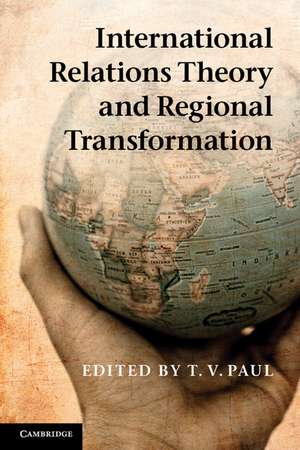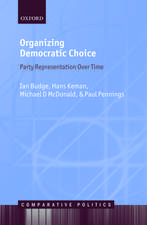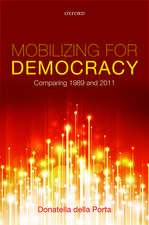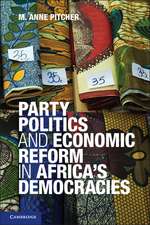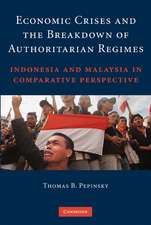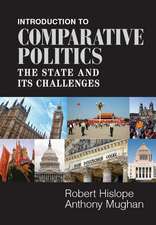International Relations Theory and Regional Transformation
Editat de T. V. Paulen Limba Engleză Paperback – 22 feb 2012
Preț: 240.63 lei
Nou
Puncte Express: 361
Preț estimativ în valută:
46.04€ • 48.08$ • 38.02£
46.04€ • 48.08$ • 38.02£
Carte tipărită la comandă
Livrare economică 15-29 aprilie
Preluare comenzi: 021 569.72.76
Specificații
ISBN-13: 9781107604551
ISBN-10: 1107604559
Pagini: 320
Ilustrații: 3 b/w illus.
Dimensiuni: 152 x 228 x 15 mm
Greutate: 0.5 kg
Ediția:New.
Editura: Cambridge University Press
Colecția Cambridge University Press
Locul publicării:New York, United States
ISBN-10: 1107604559
Pagini: 320
Ilustrații: 3 b/w illus.
Dimensiuni: 152 x 228 x 15 mm
Greutate: 0.5 kg
Ediția:New.
Editura: Cambridge University Press
Colecția Cambridge University Press
Locul publicării:New York, United States
Cuprins
Part I. Introduction: 1. Regional transformation in international relations T. V. Paul; 2. How regions were made, and the legacies for world politics: an English school reconnaissance Barry Buzan; Part II. Realist Perspectives: 3. Realism and neorealism in the study of regional conflict Dale C. Copeland; 4. Neoclassical realism and the study of regional order Jeffrey W. Taliaferro; Part III. Liberal Perspectives: 5. Economic interdependence and regional peace John M. Owen, IV; 6. Regional organizations à la carte: the effects of institutional elasticity Stephanie C. Hofmann and Frédéric Mérand; 7. Transforming regional security through liberal reforms John R. Oneal; Part IV. Constructivist Perspectives: 8. Ideas, norms, and regional orders Amitav Acharya; 9. Regional security practices and Russian–Atlantic relations Vincent Pouliot; Part V. Eclectic Perspectives: 10. The transformation of modern Europe: banalities of success John A. Hall; 11. Top-down peacemaking: why peace begins with states and not societies Norrin M. Ripsman; Part VI. Conclusions: 12. Strategies and mechanisms of regional change Stéfanie von Hlatky.
Recenzii
'Can regions transform themselves from zones of conflict to zones of cooperation and if so how? In addressing this core question, this volume skilfully bridges theoretical divides and offers strong comparative analysis on different trajectories of regional transformation, with some thought-provoking conclusions.' Louise Fawcett, St Catherine's College, University of Oxford
'This up-to-date and carefully crafted book delivers on its main promise. With an explicit focus on theories of international relations it inquires into the multidimensional and multi-causal pathways that create regional orders. An outstanding group of specialists provide illuminating and cross-paradigmatic perspectives covering most of the world's main regions.' Peter J. Katzenstein, Walter S. Carpenter, Jr Professor of International Studies, Cornell University
'The great strength of this book is the range of scholarly perspectives represented. Realists, liberals, constructivists, and others offer competing logics and claims evaluated both quantitatively and qualitatively. No previous book has been anywhere near so comprehensive in its theoretical treatment of regional transformation. This book will be the definitive reference on regional transformation for some time to come.' Douglas Lemke, Pennsylvania State University
'A vigorous revitalization of theory and research at the regional level of analysis, comparing and blending the three dominant theoretical perspectives in international politics today. The contributors' surveys and assessments of the literature and major research findings, and their stimulating displays of research techniques, all in a clear and coherent fashion, offer an excellent resource for scholars and students.' Patrick M. Morgan, Tierney Chair in Global Peace and Conflict Studies, University of California, Irvine
'Much of the most interesting work on international integration is now concerned with regional networks of organizations and commerce. This book gives a great window on what's happening in scholarship and in the world.' Bruce Russett, Dean Acheson Research Professor of International Relations, Yale University
'This up-to-date and carefully crafted book delivers on its main promise. With an explicit focus on theories of international relations it inquires into the multidimensional and multi-causal pathways that create regional orders. An outstanding group of specialists provide illuminating and cross-paradigmatic perspectives covering most of the world's main regions.' Peter J. Katzenstein, Walter S. Carpenter, Jr Professor of International Studies, Cornell University
'The great strength of this book is the range of scholarly perspectives represented. Realists, liberals, constructivists, and others offer competing logics and claims evaluated both quantitatively and qualitatively. No previous book has been anywhere near so comprehensive in its theoretical treatment of regional transformation. This book will be the definitive reference on regional transformation for some time to come.' Douglas Lemke, Pennsylvania State University
'A vigorous revitalization of theory and research at the regional level of analysis, comparing and blending the three dominant theoretical perspectives in international politics today. The contributors' surveys and assessments of the literature and major research findings, and their stimulating displays of research techniques, all in a clear and coherent fashion, offer an excellent resource for scholars and students.' Patrick M. Morgan, Tierney Chair in Global Peace and Conflict Studies, University of California, Irvine
'Much of the most interesting work on international integration is now concerned with regional networks of organizations and commerce. This book gives a great window on what's happening in scholarship and in the world.' Bruce Russett, Dean Acheson Research Professor of International Relations, Yale University
Descriere
A comprehensive treatment of regional transformation, offering insights from different theoretical perspectives and generating a range of policy-relevant ideas.
